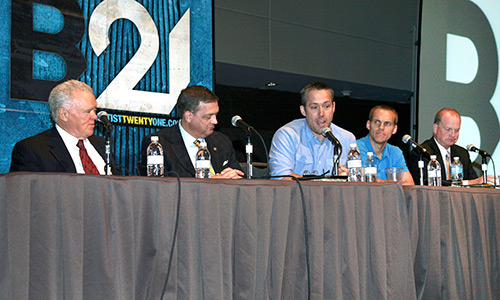In the weeks leading up to the 2012 annual meeting of the Southern Baptist Convention, more than 700 denominational leaders and pastors, including seven state convention executives, signed “A Statement of the Traditional Southern Baptist Understanding of God’s Plan of Salvation,” which reignited a long-running debate over the topic of Calvinism in the SBC.
 Baptist21, an organization that analyzes the faithfulness of Southern Baptists to gospel witness in today’s cultural context, holds a panel on the topic “The Conservative Resurgence, the Great Commission Resurgence and the Future of the SBC” June 19. Panelists include (left to right): Paige Patterson, R. Albert Mohler Jr., J.D. Greear, David Platt and Danny Akin.
Baptist21, an organization that analyzes the faithfulness of Southern Baptists to gospel witness in today’s cultural context, holds a panel on the topic “The Conservative Resurgence, the Great Commission Resurgence and the Future of the SBC” June 19. Panelists include (left to right): Paige Patterson, R. Albert Mohler Jr., J.D. Greear, David Platt and Danny Akin.SBC president Bryant Wright and Frank Page, president of the SBC Executive Committee, both chose to speak to the debate during the denomination’s annual meeting. Also, a panel representing three generations of Baptist leaders discussed Calvinism during a Baptist21 luncheon, even as LifeWay Research released a new survey showing a majority of SBC pastors are “concerned about the impact of Calvinism in our convention.”
Wright, Page and other Baptist leaders called on Southern Baptists, regardless of their position across the spectrum of the Calvinism debate, to remain united in their zeal for missions and evangelism.
Bryant Wright
The “elephant in the room” in the Southern Baptist Convention is the tension between “traditional” Southern Baptists and “Calvinists,” Southern Baptist Convention president Bryant Wright said in his message to the SBC annual meeting June 19 in New Orleans.
 Wright
Wright“Months ago – the Holy Spirit convicted me that I needed to address this elephant in the room. Little did I know that it would be such a hot topic today.”
Wright said he is concerned that Christ-centered, Bible-believing Southern Baptists will be so engaged in correcting one another’s theological views when it comes to election and salvation that they will be detracted from their mission of rescuing captives who need to be liberated by the gospel of Jesus Christ.
“These two views on election and salvation can coexist as long as we stay Christ-centered and biblically based in our theology,” Wright said.
“So a word to these two groups: To our Calvinist friends, a bit of humility would be most welcome. Anytime there is spiritual pride or intellectual pride or theological pride – it is always a sin. And an attitude of superiority – is never going to build up the church of Jesus Christ. A little humility would be appreciated.
“To those who call themselves traditional Southern Baptists, the time for being judgmental is over, because judgmentalism quickly moves into slander. And to lump all those who have a strong biblically based theology that is a more Reformed theology into hyper-Calvinism is not only misguided, but it ends up causing you to break the ninth commandment on false witness.
“It is time to show some respect to those who have differing views when it comes to election and when it comes to salvation,” Wright said.
The central focus of the Old Testament and the New Testament, Wright said, is Jesus Christ, his death and resurrection. Those who are more committed to their theological position than to Jesus Christ are guilty of “theological idolatry,” he said.
The idolatry of materialism, technology, theology, denominationalism and family are major deterrents to kingdom growth – reaching the neighborhoods and the nations of this world for Christ, Wright said.
Frank Page
“Calvinism is an issue amongst us,” Frank Page said while delivering the SBC Executive Committee report. “You may or may not like that, but it is a real issue. I don’t want to shock anyone in this room, but I am not a Calvinist. I am not. I know that shocks you. But I want to tell you this: A lot of our people are.”
 Page
PageAccording to a recent LifeWay Research poll, more than 60 percent of Southern Baptists said they were concerned about Calvinism in the convention, Page noted.
“Friends, I’m concerned because there seem to be some non-Calvinists who are more concerned about rooting out Calvinists than they are about winning the lost for Christ,” he said. “Did I tell you I’m not a Calvinist? But I am not among that number.”
Some Calvinists, Page said, “seem to think that if we do not believe the same thing about soteriology that they believe, then somehow we are less intelligent or ignorant at best.”
“I simply say to you today that it’s time to realize that a Great Commission advance needs everyone. A Great Commission advance needs everyone,” he reiterated. “Calvinists and non-Calvinists have worked together for decade upon decade upon decade in this convention.”
Page confirmed again that he plans to assemble a group of advisers to help chart a way through the division surrounding Calvinism. That will not include revising the Baptist Faith and Message, Southern Baptists’ statement of beliefs, he said.
“I do believe we can find some ways to work together better, and I believe that the leaders of both of these groups can come together to say, ‘Here’s how we can return to working together like once we did,’ ” Page said.
“If we can come together in missions and evangelism, we can come together,” Page said.
Baptist21 panel
A six-member panel of three generations of Southern Baptists was featured at a Baptist21 luncheon June 19, moderated by Jonathan Akin, senior pastor of Fairview Church in Lebanon, Tenn.
On the panel were Paige Patterson, president of Southwestern Seminary; R. Al Mohler Jr., president of Southern Seminary; Danny Akin, president of Southeastern Seminary; J.D. Greear, pastor of The Summit Church in Raleigh-Durham, N.C.; David Platt, pastor of The Church at Brook Hills in Birmingham, Ala.; and Fred Luter, pastor of Franklin Avenue Baptist Church in New Orleans.
After honoring leaders of the Conservative Resurgence, the discussion shifted to the topic of Calvinism and the recent document “A Statement of the Traditional Southern Baptist Understanding of God’s Plan of Salvation,” which by the time of the luncheon had been signed by more than 700 denominational leaders and pastors, including seven state convention executives.
Jonathan Akin mentioned that Patterson signed the document and asked Patterson if he thought Calvinists should be prohibited from serving in leadership positions within the SBC.
“No, I’ve never thought that at all,” Patterson said.
“When you get into a discussion, part of what you need to do is measure your own heat content,” he said. “The hotter you get, the less likely you are to be correct in the whole situation.”
Patterson said Southern Baptists have always had “two tributaries flowing into one river.” Pointing to church history, he said British Baptists in the 17th century failed when they split into General and Particular Baptists.
“They really needed each other; they needed the discussion. In Southern Baptist life, we’ve always been able to have this discussion,” Patterson said. Noting differing interpretations between himself and Mohler, he said: “Do we divide up and fuss and fight among ourselves? No. We state our positions clearly, as clearly as we know how, and then we go have a Baptist drink together – which is a Diet Coke. You have to learn to discuss these things without the heat content, [which] is the problem that leads to divisiveness.”
Patterson said Baptists hold to religious liberty, so he has no problem with people issuing clarifying statements on their beliefs. However, he said, “I do not raise the statement that I signed to the same significance that I would the BF&M 2000. The BF&M 2000 represents a consensus among all Southern Baptists.”
Mohler echoed those sentiments, calling for Southern Baptists to state their convictions with grace and love.
“The last thing we need is the development of theological tribes in the SBC,” Mohler said. “The point is, what are you doing in order to glorify God and bring praise and honor to the Lord Jesus Christ, pushing back the darkness and sharing the gospel and gloriously celebrating when even one sinner comes home? We earned the right, from those who came before us in the Conservative Resurgence, for us to be able to talk about doctrine without embarrassing ourselves because a failure to do that means we become a non-theological people, and a non-theological people will lose the gospel.”
Additionally, Mohler said, “There should be absolutely no criticism of anyone who has the courage to frame a theological argument and to submit it for the discussion of the denomination.”
Connecting the discussion to a local church setting, Greear said his church does not allow the topic to be a divisive issue. He said there are Calvinists and non-Calvinists in the congregation and on staff, but they work together harmoniously.
“One of the things that we’ve found is that if you’re committed to the expository preaching of the Bible – then a biblical Calvinist and a biblical Arminian end up sounding unbelievably similar on the passages they preach,” Greear said. “There is room for us to agree on the essentials of gospel proclamation and to exegete texts correctly without having to vilify one another and put one another outside of this fold.”
– Compiled from Baptist Press reports. Writers include J. Gerald Harris, Erin Roach, Tim Ellsworth and Keith Collier.